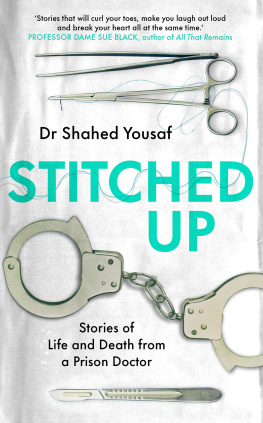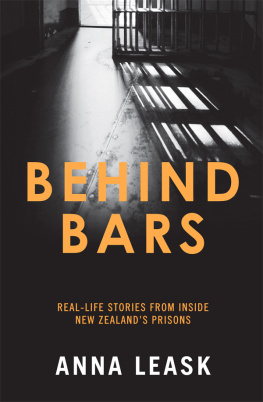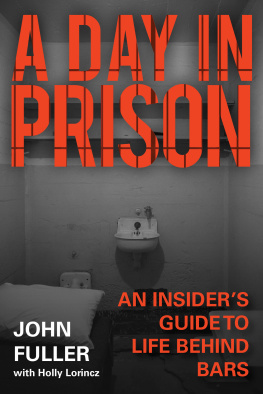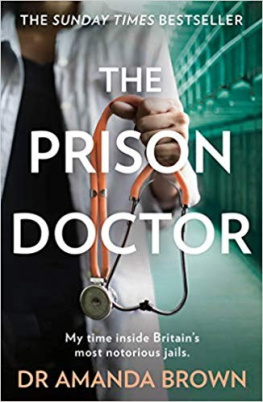Shahed Yousaf
STITCHED UP
Stories of Life and Death from a Prison Doctor

TRANSWORLD
UK | USA | Canada | Ireland | Australia
India | New Zealand | South Africa
Transworld is part of the Penguin Random House group of companies whose addresses can be found at global.penguinrandomhouse.com.

First published in Great Britain in 2022 by Bantam Press
Copyright Dr Shahed Yousaf, 2022
The moral right of the author has been asserted
Cover photos Shutterstock
Cover design by R. Shailer/TW
None of the incidents or events mentioned in this book are drawn from the authors time with their current employer, Practice Plus Group.
Every effort has been made to obtain the necessary permissions with reference to copyright material, both illustrative and quoted. We apologize for any omissions in this respect and will be pleased to make the appropriate acknowledgements in any future edition.
ISBN: 978-1-529-19287-2
This ebook is copyright material and must not be copied, reproduced, transferred, distributed, leased, licensed or publicly performed or used in any way except as specifically permitted in writing by the publishers, as allowed under the terms and conditions under which it was purchased or as strictly permitted by applicable copyright law. Any unauthorized distribution or use of this text may be a direct infringement of the authors and publishers rights and those responsible may be liable in law accordingly.
This book is dedicated to the countless offender healthcare staff and Her Majestys Prison and Probation Services staff and their families who work tirelessly to keep us all safe.
Introduction: A Broken System
Why would anyone want to work with thieves, murderers and rapists? Its a question Ive been asking myself for a decade. The year 2022 marks ten years of my working as a prison GP. I cant say it was a lifelong dream to end up behind bars, but it would also be an oversimplification to say it happened by chance. I had attained a degree in Biomedical Science and subsequently attended Warwick Medical School on a graduate entry programme in 2001. I wanted to help people on the margins of society, where the need was greatest. I am from a working-class background myself and grew up in a particularly deprived part of inner-city Birmingham. I was at medical school when I learned about the inverse care law, whereby those who have the greatest need for help are the least likely to receive it. I wanted to do something about it but I wasnt yet sure what form that would take.
The last year of medical school culminated in comprehensive examinations that covered all the learning over the past four or five years, depending on the length of the course. To fail these examinations would mean leaving without a medical degree. I was terrified of failure because there were no doctors in my family and I couldnt take success for granted. This was in 2006 and all of these years later I still have nightmares in which its the night before my final examinations and I havent prepared enough. It is a terror that many doctors will be familiar with. To make the situation even worse, unfortunately my father passed away unexpectedly on the night before my finals. In shock from seeing his dead body and having spent a sleepless night mourning with my mother and sister, I still drove to medical school the following morning with tears streaming down my face to sit my exams. It was a horrendous period in my life and one which has left a deep impression on me. I dealt with the bereavement in my own way by not talking about it and trying to block it out. In retrospect it seems clear to me that I was trying to come to terms with my own trauma by choosing to work with people whose suffering outweighed my own.
As soon as I completed my GP training in 2012 I began to work in a homeless GP practice in the West Midlands. The vast majority of service users I work with are of no fixed abode or vulnerably housed and sleep on the streets, in homeless shelters, or they sofa-surf. Many have substance-misuse issues and inject heroin and smoke crack cocaine or inject a cocktail of both, which they call snowballing or speedballing.
A disproportionately large group of our patients have mental-health issues. Many of the female patients, and some of the men, are sex workers and sleep on our doorstep at the practice when they have finished for the night. Our service works closely with SWISH, or Sex Workers into Sexual Health, which is run through the Terrence Higgins Trust.
Most importantly to me the homeless practice humanizes people. They are our patients rather than problems that need to be dealt with. During cold weather we give them our spare clothes so they can stay warm and dry. We have a partnership with a local cafe and food banks. There are booked appointments but also a drop-in service so the patients can come and see us when it is convenient for them. The practice was originally established by a group of socially minded Christian doctors and although I am a Muslim I feel a sense of pride in continuing their work. Some of our clients are highly educated professionals and former members of the armed forces who have become dependent on alcohol, drugs or gambling and have lost everything. They just need to get back on their feet and we hold out a helping hand.
The homeless practice also accepts violent and aggressive patients who have been removed from other GP lists under the Special Allocation Scheme. Under the scheme we are recognized as a secure environment and have a security guard posted outside our clinic door and a panic button hidden discreetly under the desk in case we are threatened. Were trying to help our patients, yet our front door always smells of the ammonia we use to clean up after some of them urinate against it when intoxicated or angry. Sometimes people arent willing to accept the help on offer, or they arent good at appreciating it. Some of the homeless patients will commit petty crimes in the hope that they can spend winter off the streets and in jail where they will be warm, have food and some company.
One of the doctors who worked in the homeless practice mentioned that they also did shifts in prisons and said I might enjoy it. That comment, made in passing, changed my life. Up until that point I was unaware GPs worked inside prisons. I had assumed, without giving it due thought, that prisoners would be taken to a community GP if they needed medical help or that theyd be sent to the outside hospital. I didnt know that offender healthcare was a sub-speciality of primary care and GP services. The terms prison medicine, prison GP, health in justice, healthcare in secure environments and offender healthcare are often used interchangeably, but I use the latter in this book to avoid confusion.
Since 2012 I have worked in womens prisons, with young offenders, and in mens prisons of all categories. Over the past ten years prisons in the United Kingdom have opened and closed but they currently hover around the 120 mark. Non-remand prisons only accept sentenced prisoners who are already known to the prison system and are being transferred between sites.
I have heard people say the Covid lockdown has felt like being in prison. Deprivation of liberty and social isolation take a severe mental and physical toll on our well-being.
Why do we send people to prison? We send them there as a means of punishment, for rehabilitation, in the interests of public safety and as a deterrence. If you know anything about the prison system in the UK youll understand why I say prisons mostly seem to look almost identical. Prison architecture resembles a smudged Escher-like drawing of concrete blocks, endless locked gates and staircases. But their greatest similarities lie in the problems they have in common: lack of resources, overcrowding and understaffing.











